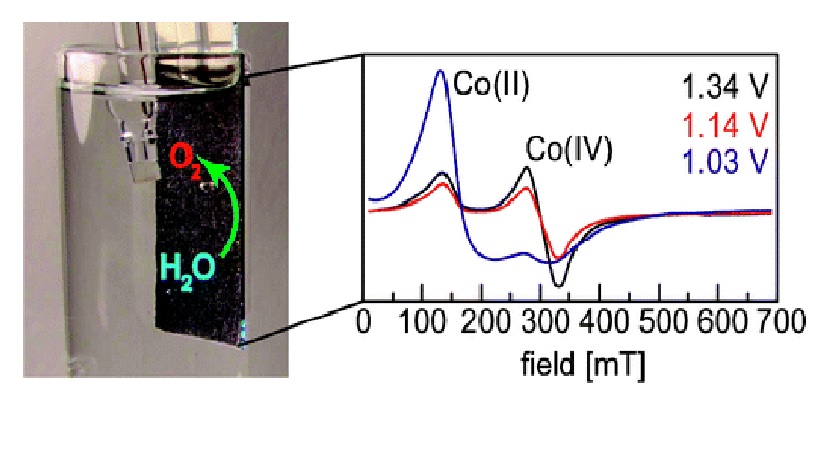Water splitting
 One of the major current research challenges is to devise environmentally benign and sustainable means for energy production and storage.
Dwindling oil resources coupled with the ever-increasing energy demand as well as the need to mitigate the effects of global warming have
led to renewed efforts in the quest for alternative, carbon-neutral fuels such as hydrogen. Harnessing renewable resources, such as water
and solar power, is an attractive approach for the production of clean hydrogen fuels through catalytic water splitting. Water splitting into
hydrogen and oxygen is achieved with expensive catalysts, which however are not practical for use in large scale energy production systems.
We are focusing on the characterization of materials relevant to alternative energy platforms with an emphasis on investigating catalytic
systems based on inexpensive, Earth-abundant transition metals (i.e., cobalt and iron). We are particularly interested in identifying the
key reactive intermediates that form along the catalytic cycle and to establish their reaction mechanisms.
One of the major current research challenges is to devise environmentally benign and sustainable means for energy production and storage.
Dwindling oil resources coupled with the ever-increasing energy demand as well as the need to mitigate the effects of global warming have
led to renewed efforts in the quest for alternative, carbon-neutral fuels such as hydrogen. Harnessing renewable resources, such as water
and solar power, is an attractive approach for the production of clean hydrogen fuels through catalytic water splitting. Water splitting into
hydrogen and oxygen is achieved with expensive catalysts, which however are not practical for use in large scale energy production systems.
We are focusing on the characterization of materials relevant to alternative energy platforms with an emphasis on investigating catalytic
systems based on inexpensive, Earth-abundant transition metals (i.e., cobalt and iron). We are particularly interested in identifying the
key reactive intermediates that form along the catalytic cycle and to establish their reaction mechanisms.
McAlpin G, Surendranath Y, Dincă M, Stich TA, Stoian SA, Casey WH, Nocera DG, Britt RD J. Am. Chem. Soc. 2010, 132, 6882-6883